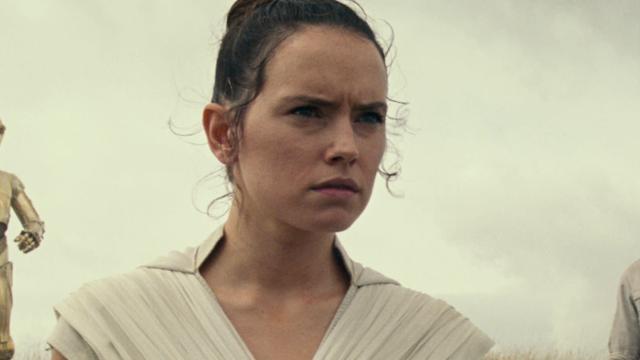As the ending to not just the sequel trilogy, but a trilogy of trilogies, we all expect Star Wars: The Rise of Skywalker to be unique. However, in a new interview, star Daisy Ridley went a step further to describe just how different it would be.
“Genre-wise, it’s different from the other two, which will become clear when the film comes out,” Ridley said in an interview with USA Today.
“It’s quite emotional. There’s a different drive than the previous two films, but there’s a lot of fun. I really missed John [Boyega] during the last one, but we’re back together and now Oscar [Isaac] is part of it. To me, it felt like kids going on an adventure.”
So does that mean the film is more dramatic? More carefree and adventurous? Does Ridley actually mean “genre” in it its usual sense, or is she more talking about “tone”? We have exactly zero answers to those questions at this point.
[referenced url=”https://gizmodo.com.au/2019/05/the-rise-of-skywalkers-new-characters-funky-planet-names-and-teases-of-rey-and-kylos-force-bond/” thumb=”https://i.kinja-img.com/gawker-media/image/upload/t_ku-large/es9pcclemsqnd4cn5wqm.jpg” title=”The Rise Of Skywalker’s New Characters, Funky Planet Names, And Teases Of Rey And Kylo’s Force Bond” excerpt=”Star Wars: The Rise of Skywalker centres around closing the decades-long Skywalker saga and paving the way for a new generation of heroes. Therefore, it only makes sense that the film is bursting with new and returning characters, including Keri Russell’s Zorri Bliss and Kylo Ren’s infamous Knights of Ren. But the laser is still focused on Rey and Kylo, whose connection could define how this story finally ends.”]
Speaking of answers, though, in the same interview Ridley did confirm The Rise of Skywalker would put the rest the question of Rey’s lineage. “[Director J.J. Abrams] did say the question is answered,” Ridley said. “So at the end of the film, you do know what the dealio is.”
Finally, and most controversially, Ridley said she understood and sympathised with Star Wars fans who were put off by Rian Johnson’s The Last Jedi, even if she disagreed with them. “I wasn’t surprised, no,” she said when asked about the backlash. “It’s just a different thing.”
“Everyone’s going to have an opinion now anyway on the internet, but I also think it’s fair,” Ridley continued.
“If people hold something incredibly dear and think they know how it should be and it’s not like that, it’s fair for people to think they were done wrong. It doesn’t mean they were — ultimately, Rian’s a filmmaker and one person can’t dictate how a film is supposed to be — but freedom of expression, sure.”
You can read more from Ridley in the full USA Today interview. And we’re sure to see more of her in the coming months as The Rise of Skywalker gets closer to its December 19 release.
[referenced url=”https://gizmodo.com.au/2019/06/when-fandom-is-the-problem/” thumb=”https://gizmodo.com.au/wp-content/uploads/2019/06/Screen-Shot-2019-06-28-at-11.58.42-am-410×231.png” title=”When Fandom Is The Problem” excerpt=””Fandom” – the participatory community that grows out of a piece of media – has come to dominate pop culture. Fandom is not simply being a fan of something. Fandom is performing being a fan by creating transformative works, collecting knowledge, cosplaying, attending conventions, and, ever-increasingly, being vocal online. Some of this has been really great for people seeking communities they can’t find in real life, empowering them to be part of something that means a lot to them. And some of it has empowered only the worst elements of fan culture.”]
